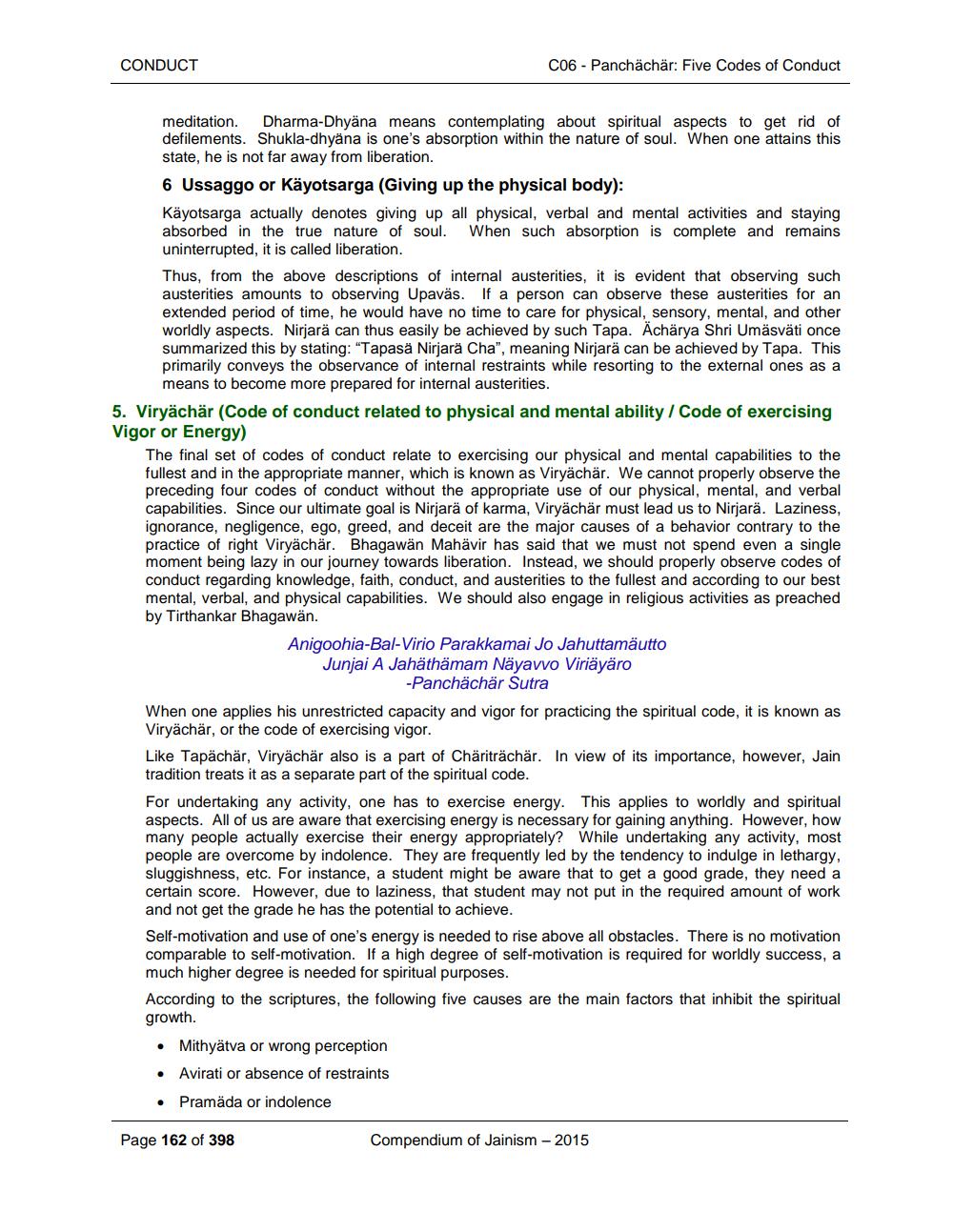________________
CONDUCT
C06 - Panchächär: Five Codes of Conduct
meditation. Dharma-Dhyana means contemplating about spiritual aspects to get rid of defilements. Shukla-dhyana is one's absorption within the nature of soul. When one attains this state, he is not far away from liberation. 6 Ussaggo or Käyotsarga (Giving up the physical body): Käyotsarga actually denotes giving up all physical, verbal and mental activities and staying absorbed in the true nature of soul. When such absorption is complete and remains uninterrupted, it is called liberation. Thus, from the above descriptions of internal austerities, it is evident that observing such austerities amounts to observing Upaväs. If a person can observe these austerities for an extended period of time, he would have no time to care for physical, sensory, mental, and other worldly aspects. Nirjarä сan thus easily be achieved by such Tapa. Acharya Shri Umäsväti once summarized this by stating: "Tapasä Nirjarä Cha", meaning Nirjarä can be achieved by Tapa. This primarily conveys the observance of internal restraints while resorting to the external ones as a
means to become more prepared for internal austerities. 5. Viryächär (Code of conduct related to physical and mental ability / Code of exercising Vigor or Energy)
The final set of codes of conduct relate to exercising our physical and mental capabilities to the fullest and in the appropriate manner, which is known as Viryachär. We cannot properly observe the preceding four codes of conduct without the appropriate use of our physical, mental, and verbal capabilities. Since our ultimate goal is Nirjarä of karma, Viryachär must lead us to Nirjarä. Laziness, ignorance, negligence, ego, greed, and deceit are the major causes of a behavior contrary to the practice of right Viryachär. Bhagawan Mahävir has said that we must not spend even a single moment being lazy in our journey towards liberation. Instead, we should properly observe codes of conduct regarding knowledge, faith, conduct, and austerities to the fullest and according to our best mental, verbal, and physical capabilities. We should also engage in religious activities as preached by Tirthankar Bhagawan.
Anigoohia-Bal-Virio Parakkamai Jo Jahuttamäutto Junjai A Jahäthämam Näyavvo Viriäyäro
-Panchächär Sutra When one applies his unrestricted capacity and vigor for practicing the spiritual code, it is known as Viryächär, or the code of exercising vigor. Like Tapächär, Viryachär also is a part of Chariträchär. In view of its importance, however, Jain tradition treats it as a separate part of the spiritual code. For undertaking any activity, one has to exercise energy. This applies to worldly and spiritual aspects. All of us are aware that exercising energy is necessary for gaining anything. However, how many people actually exercise their energy appropriately? While undertaking any activity, most people are overcome by indolence. They are frequently led by the tendency to indulge in lethargy, sluggishness, etc. For instance, a student might be aware that to get a good grade, they need a certain score. However, due to laziness, that student may not put in the required amount of work and not get the grade he has the potential to achieve. Self-motivation and use of one's energy is needed to rise above all obstacles. There is no motivation comparable to self-motivation. If a high degree of self-motivation is required for worldly success, a much higher degree is needed for spiritual purposes. According to the scriptures, the following five causes are the main factors that inhibit the spiritual growth.
• Mithyätva or wrong perception • Avirati or absence of restraints
• Pramäda or indolence
Page 162 of 398
Compendium of Jainism - 2015




